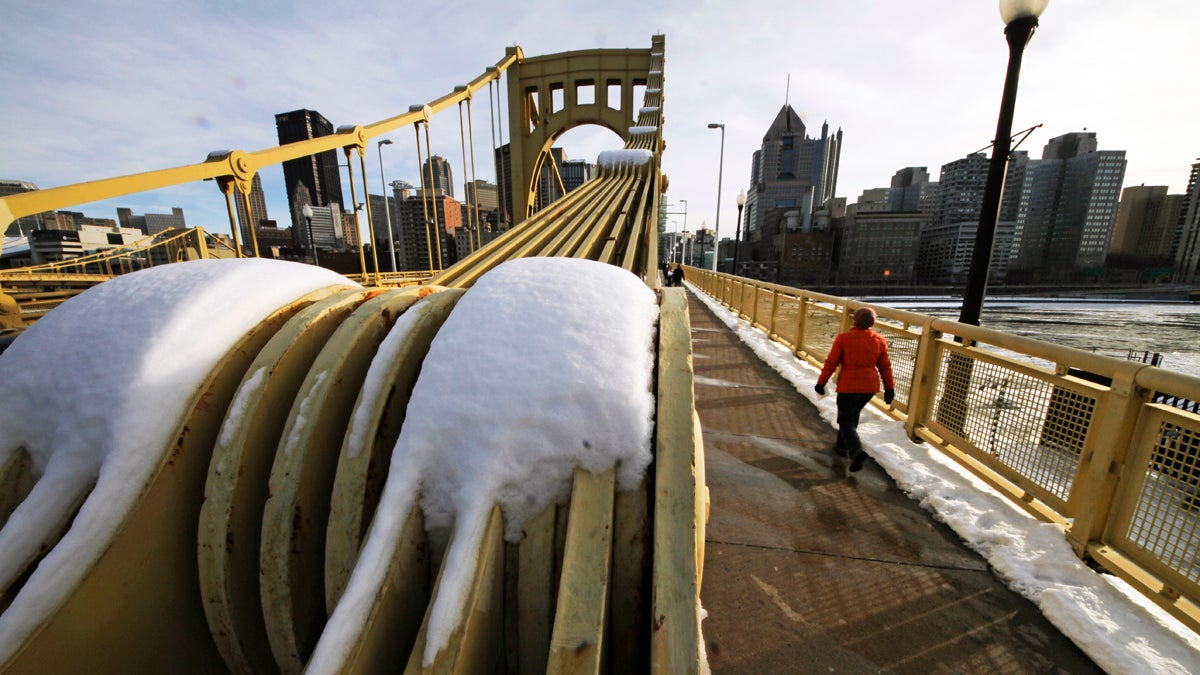In case you missed it: This week’s best reads from Pennsylvania cities

A woman walks across the Roberto Clemente bridge over the Allegheny River in downtown Pittsburgh. (AP Photo/Gene J. Puskar)
What’s up in Pennsylvania this week?
What’s up with the criminal justice system?
Federal: Last month, the U.S. Supreme Court has ruled that no teenager should be sentenced to life in prison without the possibility of parole. That’s a tall order to carry out in Pennsylvania, which has more juvenile lifers than any other state.
Bradley Bridge, a lawyer with the Defender Association of Philadelphia said, “The question is, ‘How can [the ruling] be implemented, and what exactly is required?…We need to come up with 300 prosecutors, 300 judges, 300 defense attorneys, 300 expert witnesses to be able to do that, and that will cost hundreds of millions of dollars.”
State: Gov. Wolf signed an order this week that seals the criminal records of some ex-offenders. Those charged with a second or third degree misdemeanor more than 10 years ago — with clean criminal histories since — can have the conviction removed from their record. Advocates say crimes like DUIs or possessions of small amounts of marijuana should not have to appear in employee background checks or on rental applications.
Local: Getting reliable crime statistics in Pennsylvania can be surprisingly difficult. Every municipality records crime differently, and even the uniform reporting aspects leave room for misunderstanding. For example, if someone shoots at a car with four passengers, that’s four charges of aggravated assault — even if no one was actually shot. More accurate information will require lots of additional funding, but there are a lot of demands on ever-shrinking budgets.
Like the need for more bilingual police officers. In that example, Pennsylvania cities may want to look beyond the commonwealth for inspiration: Oklahoma City and Lexington, Kentucky have both had success in finding and developing bilingual police officers.
What’s been PERColating?
Last week, we said Republican lawmakers were considering legal action to revive PERC, the municipal pension oversight agency. This week, that thing we said might happen actually happened: State Reps. Stephen Bloom and Seth Grove have filed a lawsuit against Gov. Wolf.
Wolf has asked the Commonwealth Court to back his decision to close the agency. He has said the move reduces redundancy and saves the state $605,000. Bloom and Grove, along with many other critics of the move, say PERC played an important role in stabilizing the state’s pension crisis.
What’s the big deal with infrastructure?
Infrastructure, everything that makes up our built environment, affects every aspect of our lives. From the moment you turn on the light in the morning, through your commute, to your office and home again, you are reliant on a vast system of infrastructure.
Unfortunately, as Henry Petroski wrote in his book The Road Taken, “We tend to be oblivious to much of our infrastructure, even when it is in plain sight, until something goes wrong with it.”
Before the Flint water crisis, I personally didn’t spend much time thinking about the pipes that bring water to my home. Now, I think about them every time I turn on the sink. What happened in Flint is being called the “perfect storm” of factors that ended with lead-tainted water in homes. But one major cause was the lack of investment in infrastructure improvements.
There is an estimated $60 trillion worth of infrastructure upkeep needed nationally. That’s difficult to prioritize over other visible needs, like police officers or housing upgrades. And in many cities in Pennsylvania, there isn’t money for any upgrades or improvements, no matter how necessary.
That terrifying $60 trillion number is only going to get bigger if we keep ignoring it. Flint has made me think about my water. But maybe it should make us think about all of the infrastructure we rely on daily, from the roads and bridges to the streetlights, and everything in between.
Have you had to consider the infrastructure of your house, either the paint or pipes? We’re looking for anyone who has found lead in their home, or knows someone who has, to answer a few questions about their experiences.
What’s the budget situation?
Of course, it’s hard to think about trillion-dollar infrastructure improvements when Pennsylvania can’t even stitch together a budget plan for the year.
And no budget in Harrisburg makes for a very complicated budget process across the state. Cities have to set their budget before the end of the year, but many school districts are sitting down right now to hammer out their finances.
After months of limping through the uncertainty with loans and delayed payments, public school districts have reached the end of the line.
“The message from Sharpsville [Area] School District is we’re not OK,” said Superintendent Brad Ferko. “We’ve been trained to say to the public, ‘Yeah, we’re going to make it, we’re going to be OK.’ But you know what, we’re not.”
And they’re not alone: universities, hospitals and non-profits are quickly running out of money, and options, once again.
With pensions, infrastructure and budget delays in the news once again, it’s easy to feel like we’re on one big Groundhog Day-esque loop. But the forecast is calling for warm weather this weekend, proving indisputably that time is continuing to pass.
WHYY is your source for fact-based, in-depth journalism and information. As a nonprofit organization, we rely on financial support from readers like you. Please give today.


